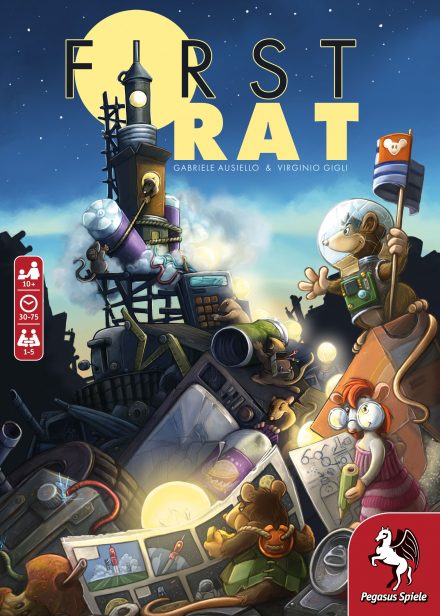For generations, the rats in the old junkyard have been telling each other the great legend about a moon made out of cheese and they want nothing more than to reach this inexhaustible treasure. One day, the little rat children discovered a comic in the junkyard that described the first landing on the moon, and thus the plan was born: Build a rocket and take over the cheese moon!
Fortunately, the junkyard has everything the rats need to build their rocket, and the other animals are willing to support this daring venture — at least if they’re well paid. Of course, all the rats work together to achieve this mighty goal. However, each rat family competes to build the most rocket parts and to train the most rattronauts so they can feast on as much of the lunar cheese as possible.
In First Rat, each player starts with two rats and may raise two more. On your turn, you either move one of your rats 1-5 spaces on the path or move 2-4 of your rats 1-3 spaces each as long as they end up on spaces of the same color. Your rats can never share the same space, and if you land in a space with another player’s rat, you must pay them one cheese, borrowing cheese from the back as needed. After movement, you collect resources (cheese, tin cans, apple cores, baking soda, etc.) matching the color of the space you occupy or move your lightbulb along the light string, which will boost your income in future turns. (More lights in the junkyard makes it easier for you to find things!)
If you end movement near a store, you can spend resources to buy a backpack or bottle top — or you can steal an item instead, with the rat then returning to the start of the movement track. You can also spend resources to build rocket sections (and score points) or spend cheese in bulk as a donation (and score points).
When you pick up apple cores, you move around the rat burrow to pick up comics or stored food or raise one of your rats from the nursery. Alternatively, you automatically get a new rat when one of your rats reaches the launch pad and boards the spaceship. When a player places their fourth rat on the spaceship — or places their eighth scoring marker on the board — the game ends, and the player with the most points wins. In the event of a tie, the tied player with the most rattronauts in the rocket wins.
First Rat includes a solo mode as well as variable game set-ups described in the rulebook.
Game Mechanics:
Game Specifications:
- 1 – 5 Players
- 30 – 75 Minutes
- Difficulty Weight 2.29










